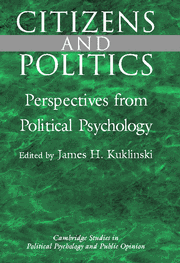Book contents
- Frontmatter
- Contents
- List of Contributors
- Prologue: Political Psychology and the Study of Citizens and Politics
- PART I AFFECT AND EMOTIONS
- PART II POLITICAL COGNITION
- PART III POLITICAL ATTITUDES AND PERCEPTIONS
- Introduction
- 9 Public Opinion and Democratic Politics: The Problem of Nonattitudes and Social Construction of Political Judgment
- 10 Implications of a Latitude-Theory Model of Citizen Attitudes for Political Campaigning, Debate, and Representation
- 11 Where You Stand Depends on What You See: Connections Among Values, Perceptions of Fact, and Political Prescriptions
- 12 Commentary: The Meaning of “Attitude” in Representative Democracies
- PART IV POLITICAL VALUES
- Index
- Titles in the series
Introduction
Published online by Cambridge University Press: 07 October 2011
- Frontmatter
- Contents
- List of Contributors
- Prologue: Political Psychology and the Study of Citizens and Politics
- PART I AFFECT AND EMOTIONS
- PART II POLITICAL COGNITION
- PART III POLITICAL ATTITUDES AND PERCEPTIONS
- Introduction
- 9 Public Opinion and Democratic Politics: The Problem of Nonattitudes and Social Construction of Political Judgment
- 10 Implications of a Latitude-Theory Model of Citizen Attitudes for Political Campaigning, Debate, and Representation
- 11 Where You Stand Depends on What You See: Connections Among Values, Perceptions of Fact, and Political Prescriptions
- 12 Commentary: The Meaning of “Attitude” in Representative Democracies
- PART IV POLITICAL VALUES
- Index
- Titles in the series
Summary
The study of attitudes is the bread and butter of public opinion research. It has a history traceable at least to the Lazarsfeld-led Columbia studies conducted during the 1940s and early 1950s. A decade after the last of the Columbia studies was published, Converse crystallized what continues to be a strongly debated question: just how real and meaningful are ordinary citizens' attitudes?
Converse reported compelling evidence that the majority of people lacked stable or consistent attitudes. Their expressed policy preferences changed randomly over time and reflected almost no liberal-conservative coherence across issue domains. In Converse's view, most citizens could not, or at least did not, engage issues of public policy.
Although several scholars raised serious challenges to Converse's portrayal, only recently has anyone proposed a new and fundamentally different conception of attitudes and attitude formation. In his 1992 publication The Nature and Origins of Mass Opinion, John Zaller adopts a social constructionist perspective that had gained some prominence in social psychology. For any given policy domain, he argues, people hold more than one relevant consideration; what an individual's preference will be at any given time depends on which considerations prevail, which in turn depends on the social cues that the individual happens to receive. Thus, for example, a taxpayer might initially oppose increased school funding because high property taxes come to mind but then later support it because another consideration, low teachers' salaries, say, gains her attention.
- Type
- Chapter
- Information
- Citizens and PoliticsPerspectives from Political Psychology, pp. 243 - 253Publisher: Cambridge University PressPrint publication year: 2001

